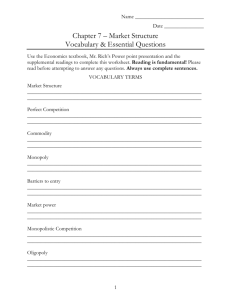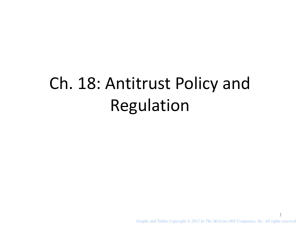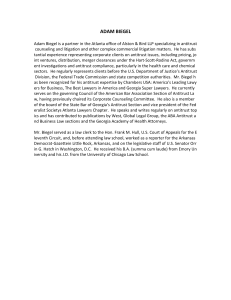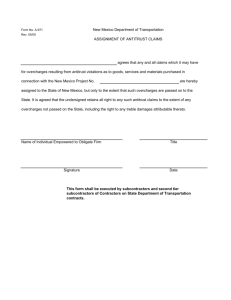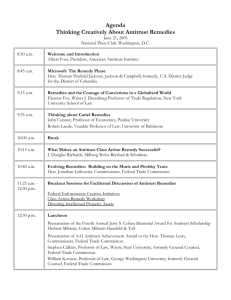Promoting Innovation
advertisement
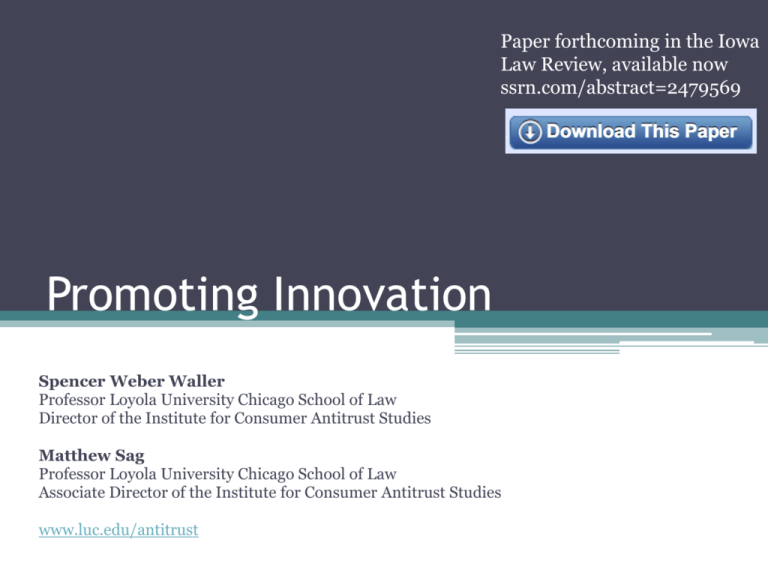
Paper forthcoming in the Iowa Law Review, available now ssrn.com/abstract=2479569 Promoting Innovation Spencer Weber Waller Professor Loyola University Chicago School of Law Director of the Institute for Consumer Antitrust Studies Matthew Sag Professor Loyola University Chicago School of Law Associate Director of the Institute for Consumer Antitrust Studies www.luc.edu/antitrust Joseph Schumpeter and Competition • Prominent and Prolific Austrian and Harvard Economist • Deeply Influential and Controversial • Deemphasized Emphasis on Perfect Competition and Focused Instead on Entrepreneurship and Innovation Schumpeter’s Key Insights • Innovation is the key to long run economic growth. • Dominant firms have the resources to fund R&D and innovation. • Dominance is fleeting, creative destruction is an ever-present threat. ▫ If all of the above is true, what are the implications for laws regulating the market place, such as antitrust and intellectual property? Schumpeter = Laissez Faire Antitrust? • See, e.g. Ward S. Bowman, Jr., Toward Less Monopoly, 101 U. PA. L. Rev. 577, 623 (1953). F.M. Scherer, Antitrust, Efficiency, and Progress, 62 N.Y.U. L. Rev. 998, 1001 (1987) (under Schumpeter antitrust may not “particularly important”) Harold Demsetz, How Many Cheers for Antitrust's 100 Years?, 30 Econ Inquiry 207 (1992) Glen O. Robinson, On Refusing to Deal with Rivals, 87 Cornell L. Rev. 1177, 1180 (2002) Keith W. Hylton & Haizhen Lin, Innovation and Optimal Punishment, with Antitrust Implications, 10 J. Comp. L. & Econ. 1 (March 2014) Beyond Laissez Faire, Towards a Real Schumpeterian Antitrust Policy • Creative destruction may be irresistible over the long run • But there is much that incumbent firms can do in the short to medium term to suppress disruptive innovation. [T]here are means available to the successful entrepreneur – patents, ‘strategy’, and so on – for prolonging the life of his monopolistic or quasimonopolistic position and for rendering it more difficult for competitors to close up on him. – JOSEPH A. SCHUMPETER, HISTORY OF ECONOMIC ANALYSIS 897-98 (Elizabeth Boody Schumpeter ed. 1954) Our Proposal for Antitrust Policy in a Schumpeterian Light • We should regard innovation and creative destruction as a two-stage sequence rather than a single-stage operation. • Maximize incentives and opportunities for challengers to innovate to displace incumbents • Minimize incentives and opportunities for incumbents to engaging in exclusionary conduct aimed at preventing/forestalling creative destruction. Balance Required • “[t]he successful competitor, having been urged to compete, must not be turned upon when he wins.” Judge Learned Hand, United States v. Aluminum Co. of America. • “we should not allow the current frontrunner in a race to declare permanent victory at the moment of his choosing.” Waller & Sag, Promoting Innovation, 100 Iowa Law Review, __ 2015 Schumpeterian Perspective also Includes Policies Beyond Traditional Competition Law Competition Law Net Neutrality Access to Infrastructure Sectoral Regulation Intellectual Property Law Application • • • • • Unilateral Conduct Cases IP/Antitrust Section 1 Cases Merger Review Competition advocacy Addressed in much more detail in the paper • Our broader point: Current U.S. Policy is Broadly Consistent with Such a Focus on Innovation Current U.S. Policy Broadly Consistent with Such a Focus on Innovation • Abandonment of Criminal Monopolization Enforcement • Little Government Use of Attempted Monopolization • Few Government Cases on How Firm Gained Monopoly Power • Language in Trinko • Most Focused on Monopoly Maintenance • Microsoft as Road Map Many Definitions of Innovation • McGowan – change to the status quo that 1) allows one to do something one could not before or 2) allows one to do something already possible while using fewer resources than before. Microsoft as Case Study • No Effort to Challenge Microsoft’s Acquisition of Monopoly Power • “It is certainly true that Windows may have gained its initial dominance in the operating system market competitively – through superior foresight or industry.” • Equally possible that Microsoft gained dominance through sheer luck when IBM choose to focus on hardware rather than software but not on Government’s case in either event. • Neither Problematic from an Antitrust Point of View Microsoft as Monopoly Maintenance • Case Focused Instead on What Microsoft Did to Maintain its Dominance in Face of Actual and Potential Competitive Threats ▫ Netscape ▫ Java • Attempted Monopolization Claim of Internet Browsing Market Rejected • Great Deference to Product Design and Innovation • Government Prevailed Where Microsoft Failed to Support Any Legitimate Pro-Competitive Justification • Microsoft Won on Any Count Where it had such a Justification • Relief Behavioral and Nuanced in Part to Preserve Innovation and Hard Competition Even by Dominant Firm The E-Book Case • Successful Civil Per Se Section 1 Case by Government Against Traditional Publishers and Apple • Defendants Seeking to Change Pricing Policies and Increase Prices of E-Books • Controversial in US and EU Because of Market Power of Amazon in E-Books and Reader Market • Looks Less Controversial When Seen through Schumpeterian Lens of Old Industry Seeking to Preserve its Business Model From Continued Threat of “Creative Destruction” of E-Books Innovation and Future Cases and Investigations • Google ▫ US ▫ EU • Facebook and Social Media Not Everything is Innovation • Not Arguing that only Innovation Cases Should be Brought • Plenty of Good Reasons to Bring Sound Traditional Cases ▫ Cartels ▫ Unilateral Conduct ▫ Mergers • But Remember Values of Innovation Likely to Dwarf Preservation of Consumer Surplus in Most Instances More a Matter of Priorities Than Doctrine • Worth Multiple Challenges to Small Unreported and Consummated Mergers? • Need Long-Term Perspective on Value of Innovation ▫ Incremental Innovation by Incumbent Versus Disruptive Innovation by Challengers? ▫ What if trivial innovation versus massive exclusion? ▫ How can we tell? • Careful Use of Competition Advocacy Vital ▫ North Carolina Dental Board ▫ Uber ▫ What if you Could Only Choose One? • Less Enforcement? ▫ Baby Food ▫ Sulfuric Acid • Private Enforcement For More Information Contact • Spencer Weber Waller • Professor and Director Institute for Consumer Antitrust Studies • Loyola University Chicago School of Law • swalle1@luc.edu • www.luc.edu/antitrust • Matthew Sag • Professor and Associate Director Institute for Consumer Antitrust Studies • Loyola University Chicago School of Law • msag@luc.edu • www.luc.edu/antitrust
